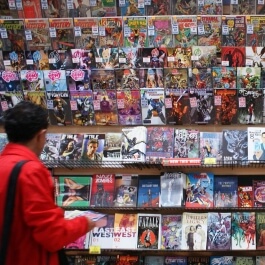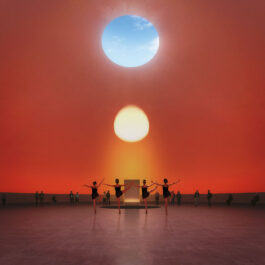Culture
Movie Cheat Sheet: Anime
Slide Nr 1Anime is, on paper, a reasonably straightforward proposition: the term loosely refers to animated films of a particular style, usually associated with Japan. However, the history and diversity of anime can make the genre seem quite dense, with all kinds of stories being told in a way that may appear a bit daunting to those only familiar with Western movies. But once you take those first steps into the works of filmmakers, writers and animators who are renowned the world over, the intelligence and majesty of anime really begins to emerge. Here are a few titles that we consider to be good starting points for those intrigued by this cinematic institution…
0/11
Culture
Movie Cheat Sheet: Anime.
Slide Nr 2My Neighbour Totoro (1988) – We could devote this list entirely to Studio Ghibli, an animation house so prestigious that many have compared its influence to that of Walt Disney (although founder and directing legend Hayao Miyazaki dislikes the juxtaposition). Nonetheless, Disney and Studio Ghibli do bear loose resemblance in stature and spectacle. Studio Ghibli has a reputation for making each new movie an event, and that reputation began with this, the third film under the banner. Heartfelt and ethereal storytelling underpin a story that’s accessible to all ages, following two young sisters as they encounter woodland spirits in rural Japan – most memorably Totoro, the portly character who still acts as Studio Ghibli’s mascot more than 30 years later.
1/11
Culture
Movie Cheat Sheet: Anime.
Slide Nr 3Akira (1988) – Of course, for those who wish to dive into the deep end, this is a good place to start! Considered one of the greatest animated films of all time, as well as a defining moment in science fiction, Akira weaves a rich narrative tapestry led by biker Shōtarō Kaneda, who fights many oppressive elements while helping his friend, Tetsuo Shima, who has begun to develop telekinetic abilities. Unmistakably mature in its content, this adaptation of the popular manga will sear itself into your mind, as it did to the millions of fans who turned it from box office flop to cult favourite over time.
2/11
Culture
Movie Cheat Sheet: Anime.
Slide Nr 4Ghost in the Shell (1995) – The 2017 Hollywood remake of this classic anime was poorly received for a number of reasons, but one of the bigger complaints was that the 1995 original is hard to beat. Establishing an aesthetic that seemed to define the cyberpunk subgenre, this story of a cyborg security agent hunting a mysterious hacker may seem complex to newcomers, but chances are you’ve already seen films influenced by it. The Wachowski Siblings used the film as direct inspiration for The Matrix (mimicking the digital code ‘rain’ effect), and it’s been cited as an inspiration for films such as Avatar and Ex Machina.
3/11
Culture
Movie Cheat Sheet: Anime.
Slide Nr 5Perfect Blue (1997) – Western audiences may be used to animated films mainly intended for children. However, there’s not a whole lot of family friendliness to this psychological thriller about a singer in a girl group who leaves music – and her squeaky clean image – to pursue acting. A stalker takes issue with this change, resulting in several murders of those he deems ‘responsible’. A dark and visually brutal drama, the movie has stood the test of time thanks to its enduring mystery and captivating visuals. It’s a favourite among directors such as Terry Gilliam and Darren Aronofsky, who remade one of the movie’s scenes for his 2000 film Requiem for a Dream.
4/11
Culture
Movie Cheat Sheet: Anime.
Slide Nr 6Spirited Away (2001) – Only one foreign language movie has ever won the Oscar for Best Animated Film, which gives you an idea of just how special Spirited Away is. This Studio Ghibli classic about a 10-year-old working in a supernatural realm to free her parents from a spell is one of those movies that stays with you for a long time – and for many, it redefined what animated film is capable of. It’s also the project that introduced both Studio Ghibli and director Hayao Miyazaki to Western audiences, creating a following that would challenge the dominance of Disney and its contemporaries.
5/11
Culture
Movie Cheat Sheet: Anime.
Slide Nr 7Metropolis (2001) – When is a remake not a remake? When it’s 2001’s Metropolis, based on the manga by Osamu Tezuka that was, in turn, inspired by a single image from Fritz Lang’s 1927 silent film. A smart script by Akira director Katsuhiro Ôtomo opens up a story featuring robots, futuristic cities – and a plot to destroy mankind. This is a feast for the eyes, as elements of Lang’s film are remixed and transported into a world that has to be seen to be believed.
6/11
Culture
Movie Cheat Sheet: Anime.
Slide Nr 8The Animatrix (2003) – If you absolutely need a Hollywood connection as a gateway into anime, this early 2000s spin-off anthology should be a good start. A collection of animated shorts made at the height of the Wachowski-helmed Matrix franchise’s popularity, The Animatrix is both a study in form and a nod to the influence anime had on the blockbuster sci-fi hit. From the universe-expanding spectacle of Last Flight of the Osiris, to the downbeat noir of A Detective Story, it’s a fun way of wrapping a familiar franchise in a new style.
7/11
Culture
Movie Cheat Sheet: Anime.
Slide Nr 9Steamboy (2004) – Director Katsuhiro Ôtomo’s second animated feature following Akira, Steamboy isn’t as heralded as its predecessor, but it is a captivating adventure for those looking to dip their toes into anime without diving head first into something too complex. Set in an alternate 1800s England, we follow a young teenager who finds himself the target of nefarious foes when his grandfather gives him a mysterious orb. There are certainly more accomplished movies in the genre, but in terms of visual prowess, this is one film that will leave you in awe.
8/11
Culture
Movie Cheat Sheet: Anime.
Slide Nr 10Paprika (2006) – Paprika has been cited by many as a major influence on Christopher Nolan’s 2010 film Inception, given that it features a strikingly similar plot (a psychotherapist who’s able to enter her patients’ dreams) as well as certain visual aspects. The late Satoshi Kon’s final film moves in a much bolder direction than Nolan’s work, however. Vibrant, audacious and happy to leave you occasionally baffled, Paprika is a wondrous maze of a film that shows anime at its most ambitious.
9/11
Culture
Movie Cheat Sheet: Anime.
Slide Nr 11Your Name (2016) – Makoto Shinkai made history four years ago when he adapted his own novel and raked in over USD 350 million worldwide at the box office; Your Name became the fourth highest grossing film in Japanese history, accounting for 10% of all tickets sold that year in the country. Such lofty achievements are certainly befitting of a film that blows you away with intricate storytelling. Delicately balancing fantasy with relatable themes, we follow a teenage boy and girl who swap lives intermittently, embarking on a plot filled with comedy, heart and terrific animation. Proof that even familiar concepts can be made unique with the right focus.
10/11
Culture
Movie Cheat Sheet: Anime.
Slide Nr 12Honourable Mention: Death Note (2006) – If you’re looking for a bingeable series to go along with these feature films, we recommend the 2006 animated TV adaptation of the popular manga Death Note, which has also been adapted into feature films and live action portrayals. The series tells the eerie tale of a young man named Light Yagami who is given a ‘Death Note’ – a book that kills anyone whose name is written in it. At first Yagami uses the book to rid the world of evil, but naturally complications begin to occur. A dark and captivating story that will draw you in.
11/11
















Sorry, the comment form is closed at this time.